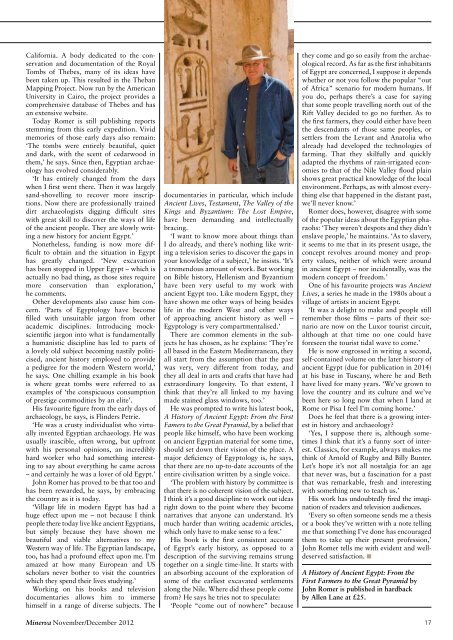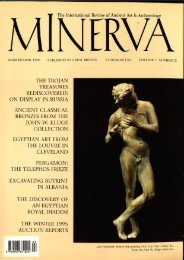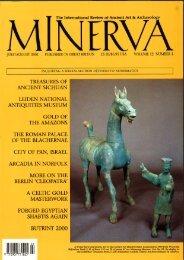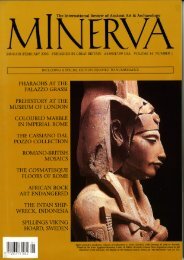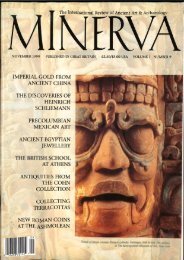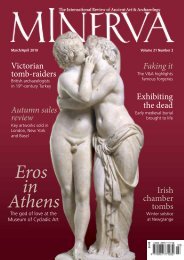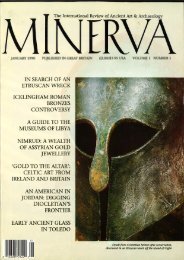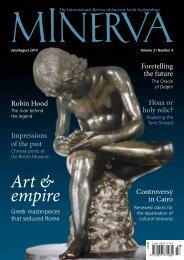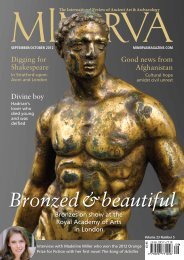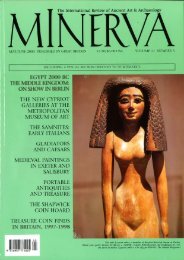Following Odysseus Not the end of the world Amarna city of light ...
Following Odysseus Not the end of the world Amarna city of light ...
Following Odysseus Not the end of the world Amarna city of light ...
- No tags were found...
Create successful ePaper yourself
Turn your PDF publications into a flip-book with our unique Google optimized e-Paper software.
California. A body dedicated to <strong>the</strong> conservationand documentation <strong>of</strong> <strong>the</strong> RoyalTombs <strong>of</strong> Thebes, many <strong>of</strong> its ideas havebeen taken up. This resulted in <strong>the</strong> ThebanMapping Project. Now run by <strong>the</strong> AmericanUniversity in Cairo, <strong>the</strong> project provides acomprehensive database <strong>of</strong> Thebes and hasan extensive website.Today Romer is still publishing reportsstemming from this early expedition. Vividmemories <strong>of</strong> those early days also remain:‘The tombs were entirely beautiful, quietand dark, with <strong>the</strong> scent <strong>of</strong> cedarwood in<strong>the</strong>m,’ he says. Since <strong>the</strong>n, Egyptian archaeologyhas evolved considerably.‘It has entirely changed from <strong>the</strong> dayswhen I first went <strong>the</strong>re. Then it was largelysand-shovelling to recover more inscriptions.Now <strong>the</strong>re are pr<strong>of</strong>essionally traineddirt archaeologists digging difficult siteswith great skill to discover <strong>the</strong> ways <strong>of</strong> life<strong>of</strong> <strong>the</strong> ancient people. They are slowly writinga new history for ancient Egypt.’None<strong>the</strong>less, funding is now more difficultto obtain and <strong>the</strong> situation in Egypthas greatly changed. ‘New excavationhas been stopped in Upper Egypt – which isactually no bad thing, as those sites requiremore conservation than exploration,’he comments.O<strong>the</strong>r developments also cause him concern.‘Parts <strong>of</strong> Egyptology have becomefilled with unsuitable jargon from o<strong>the</strong>racademic disciplines. Introducing mockscientificjargon into what is fundamentallya humanistic discipline has led to parts <strong>of</strong>a lovely old subject becoming nastily politicised,ancient history employed to providea pedigree for <strong>the</strong> modern Western <strong>world</strong>,’he says. One chilling example in his bookis where great tombs were referred to asexamples <strong>of</strong> ‘<strong>the</strong> conspicuous consumption<strong>of</strong> prestige commodities by an elite’.His favourite figure from <strong>the</strong> early days <strong>of</strong>archaeology, he says, is Flinders Petrie.‘He was a crusty individualist who virtuallyinvented Egyptian archaeology. He wasusually irascible, <strong>of</strong>ten wrong, but upfrontwith his personal opinions, an incrediblyhard worker who had something interestingto say about everything he came across– and certainly he was a lover <strong>of</strong> old Egypt.’John Romer has proved to be that too andhas been rewarded, he says, by embracing<strong>the</strong> country as it is today.‘Village life in modern Egypt has had ahuge effect upon me – not because I thinkpeople <strong>the</strong>re today live like ancient Egyptians,but simply because <strong>the</strong>y have shown mebeautiful and viable alternatives to myWestern way <strong>of</strong> life. The Egyptian landscape,too, has had a pr<strong>of</strong>ound effect upon me. I’mamazed at how many European and USscholars never bo<strong>the</strong>r to visit <strong>the</strong> countrieswhich <strong>the</strong>y sp<strong>end</strong> <strong>the</strong>ir lives studying.’Working on his books and televisiondocumentaries allows him to immersehimself in a range <strong>of</strong> diverse subjects. TheMinerva November/December 2012documentaries in particular, which includeAncient Lives, Testament, The Valley <strong>of</strong> <strong>the</strong>Kings and Byzantium: The Lost Empire,have been demanding and intellectuallybracing.‘I want to know more about things thanI do already, and <strong>the</strong>re’s nothing like writinga television series to discover <strong>the</strong> gaps inyour knowledge <strong>of</strong> a subject,’ he insists. ‘It’sa trem<strong>end</strong>ous amount <strong>of</strong> work. But workingon Bible history, Hellenism and Byzantiumhave been very useful to my work withancient Egypt too. Like modern Egypt, <strong>the</strong>yhave shown me o<strong>the</strong>r ways <strong>of</strong> being besideslife in <strong>the</strong> modern West and o<strong>the</strong>r ways<strong>of</strong> approaching ancient history as well –Egyptology is very compartmentalised.’There are common elements in <strong>the</strong> subjectshe has chosen, as he explains: ‘They’reall based in <strong>the</strong> Eastern Mediterranean, <strong>the</strong>yall start from <strong>the</strong> assumption that <strong>the</strong> pastwas very, very different from today, and<strong>the</strong>y all deal in arts and crafts that have hadextraordinary longevity. To that extent, Ithink that <strong>the</strong>y’re all linked to my havingmade stained glass windows, too.’He was prompted to write his latest book,A History <strong>of</strong> Ancient Egypt: From <strong>the</strong> FirstFamers to <strong>the</strong> Great Pyramid, by a belief thatpeople like himself, who have been workingon ancient Egyptian material for some time,should set down <strong>the</strong>ir vision <strong>of</strong> <strong>the</strong> place. Amajor deficiency <strong>of</strong> Egyptology is, he says,that <strong>the</strong>re are no up-to-date accounts <strong>of</strong> <strong>the</strong>entire civilisation written by a single voice.‘The problem with history by committee isthat <strong>the</strong>re is no coherent vision <strong>of</strong> <strong>the</strong> subject.I think it’s a good discipline to work out ideasright down to <strong>the</strong> point where <strong>the</strong>y becomenarratives that anyone can understand. It’smuch harder than writing academic articles,which only have to make sense to a few.’His book is <strong>the</strong> first consistent account<strong>of</strong> Egypt’s early history, as opposed to adescription <strong>of</strong> <strong>the</strong> surviving remains strungtoge<strong>the</strong>r on a single time-line. It starts withan absorbing account <strong>of</strong> <strong>the</strong> exploration <strong>of</strong>some <strong>of</strong> <strong>the</strong> earliest excavated settlementsalong <strong>the</strong> Nile. Where did <strong>the</strong>se people comefrom? He says he tries not to speculate:‘People “come out <strong>of</strong> nowhere” because<strong>the</strong>y come and go so easily from <strong>the</strong> archaeologicalrecord. As far as <strong>the</strong> first inhabitants<strong>of</strong> Egypt are concerned, I suppose it dep<strong>end</strong>swhe<strong>the</strong>r or not you follow <strong>the</strong> popular “out<strong>of</strong> Africa” scenario for modern humans. Ifyou do, perhaps <strong>the</strong>re’s a case for sayingthat some people travelling north out <strong>of</strong> <strong>the</strong>Rift Valley decided to go no fur<strong>the</strong>r. As to<strong>the</strong> first farmers, <strong>the</strong>y could ei<strong>the</strong>r have been<strong>the</strong> desc<strong>end</strong>ants <strong>of</strong> those same peoples, orsettlers from <strong>the</strong> Levant and Anatolia whoalready had developed <strong>the</strong> technologies <strong>of</strong>farming. That <strong>the</strong>y skilfully and quicklyadapted <strong>the</strong> rhythms <strong>of</strong> rain-irrigated economiesto that <strong>of</strong> <strong>the</strong> Nile Valley flood plainshows great practical knowledge <strong>of</strong> <strong>the</strong> localenvironment. Perhaps, as with almost everythingelse that happened in <strong>the</strong> distant past,we’ll never know.’Romer does, however, disagree with some<strong>of</strong> <strong>the</strong> popular ideas about <strong>the</strong> Egyptian pharaohs:‘They weren’t despots and <strong>the</strong>y didn’tenslave people,’ he maintains. ‘As to slavery,it seems to me that in its present usage, <strong>the</strong>concept revolves around money and propertyvalues, nei<strong>the</strong>r <strong>of</strong> which were aroundin ancient Egypt – nor incidentally, was <strong>the</strong>modern concept <strong>of</strong> freedom.’One <strong>of</strong> his favourite projects was AncientLives, a series he made in <strong>the</strong> 1980s about avillage <strong>of</strong> artists in ancient Egypt.‘It was a de<strong>light</strong> to make and people stillremember those films – parts <strong>of</strong> <strong>the</strong>ir scenarioare now on <strong>the</strong> Luxor tourist circuit,although at that time no one could haveforeseen <strong>the</strong> tourist tidal wave to come.’He is now engrossed in writing a second,self-contained volume on <strong>the</strong> later history <strong>of</strong>ancient Egypt (due for publication in 2014)at his base in Tuscany, where he and Bethhave lived for many years. ‘We’ve grown tolove <strong>the</strong> country and its culture and we’vebeen here so long now that when I land atRome or Pisa I feel I’m coming home.’Does he feel that <strong>the</strong>re is a growing interestin history and archaeology?‘Yes, I suppose <strong>the</strong>re is, although sometimesI think that it’s a funny sort <strong>of</strong> interest.Classics, for example, always makes methink <strong>of</strong> Arnold <strong>of</strong> Rugby and Billy Bunter.Let’s hope it’s not all nostalgia for an agethat never was, but a fascination for a pastthat was remarkable, fresh and interestingwith something new to teach us.’His work has undoubtedly fired <strong>the</strong> imagination<strong>of</strong> readers and television audiences.‘Every so <strong>of</strong>ten someone s<strong>end</strong>s me a <strong>the</strong>sisor a book <strong>the</strong>y’ve written with a note tellingme that something I’ve done has encouraged<strong>the</strong>m to take up <strong>the</strong>ir present pr<strong>of</strong>ession,’John Romer tells me with evident and welldeservedsatisfaction. nA History <strong>of</strong> Ancient Egypt: From <strong>the</strong>First Farmers to <strong>the</strong> Great Pyramid byJohn Romer is published in hardbackby Allen Lane at £25.17


